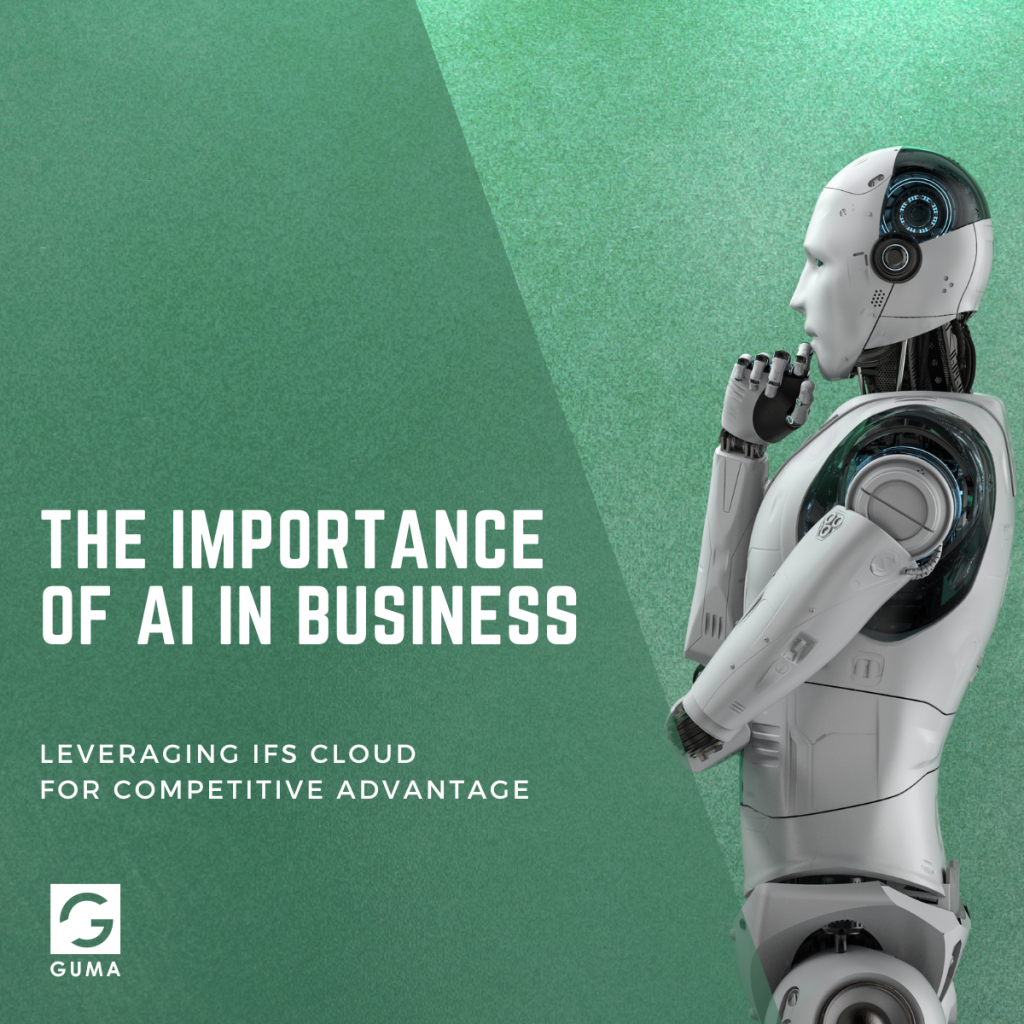Artificial Intelligence (AI) has become an indispensable part of modern business operations, driving innovation, efficiency, and competitive advantage. As we stand on the brink of unprecedented change, the integration of AI into business processes is not just a luxury but a necessity. This transformation is evident in the capabilities offered by IFS Cloud, which integrates AI to deliver significant benefits across various industries.
The Importance of AI in Business
AI is revolutionizing how businesses operate, making processes more efficient, enhancing decision-making, and enabling new levels of productivity. The importance of AI can be summarized in several key areas:
- Efficiency: AI automates routine tasks, freeing up human resources to focus on more strategic activities. This not only boosts productivity but also reduces operational costs.
- Decision-Making: AI provides data-driven insights that enhance decision-making processes. By analyzing vast amounts of data, AI can identify patterns and trends that may not be immediately apparent to human analysts.
- Competitive Advantage: Companies that leverage AI effectively can gain a significant edge over their competitors. AI enables faster innovation cycles, better customer experiences, and more efficient operations.
- Customer Experience: AI-driven tools can personalize customer interactions, providing tailored recommendations and support that enhance satisfaction and loyalty.

IFS Cloud: Bringing AI to Industries
IFS Cloud offers a suite of AI capabilities that are seamlessly embedded within its ERP, EAM, and FSM solutions. These capabilities are designed to address industry-specific challenges, making AI accessible and beneficial for a wide range of sectors, including manufacturing, energy and utilities, construction and engineering, service industries, telecommunications, and aerospace and defense.
Key AI Capabilities in IFS Cloud
- Content Generation: AI-powered tools within IFS Cloud can automatically generate various types of content, streamlining workflows and enhancing productivity. This includes generating question-answer responses, creating customer orders from uploaded documents, and providing proactive information to field technicians.
- Recommendations: The AI recommendation engine in IFS Cloud suggests the next best actions based on diverse circumstances and options. This capability assists in complex decision-making, guiding users through available options and their potential consequences.
- Anomaly Detection: AI can identify deviations from normal behavior, signaling potential issues before they escalate. This proactive approach enables timely interventions, reducing downtime and maintaining operational efficiency.
- Optimization: AI-driven optimization tools help allocate resources and perform activities in the most efficient manner, considering constraints and objectives. This is crucial for scheduling tasks, sequencing production orders, and planning maintenance activities.
- Forecasting and Simulation: IFS Cloud uses AI to predict future trends based on historical data. This capability helps businesses anticipate changes and plan accordingly, ensuring they stay ahead of market demands.
- Contextual Knowledge: AI in IFS Cloud analyzes structured and unstructured data sources to provide relevant information and guidance. This contextual knowledge supports better decision-making and enhances overall business operations.
Real-World Applications
The benefits of AI in IFS Cloud extend to real-world applications, driving value in several key areas:
- Predictive Maintenance: By leveraging AI, IFS Cloud enables predictive maintenance, which minimizes downtime and optimizes asset performance. This ensures that equipment remains operational, reducing costs and enhancing customer satisfaction.
- Supply Chain Management: AI enhances supply chain efficiency by predicting demand, optimizing inventory levels, and improving supplier relationships. This results in lower costs, reduced waste, and improved service levels.
- Field Service Management: AI-driven tools in IFS Cloud enhance field service management by providing technicians with real-time information and guidance, ensuring first-time fixes and improving customer experiences.
The Future of AI with IFS Cloud
As AI technology continues to evolve, IFS Cloud is poised to deliver even greater benefits. Future updates will include advanced AI-driven functionalities and a deeper integration of AI capabilities across all business processes. This will enable businesses to stay agile, innovative, and competitive in an ever-changing market landscape.
In conclusion, the integration of AI into business operations through solutions like IFS Cloud is essential for achieving efficiency, enhancing decision-making, and maintaining a competitive edge. By leveraging the powerful AI capabilities within IFS Cloud, businesses can unlock new levels of productivity and drive long-term success.
ABOUT THE AUTHOR
With over 20 years of professional expertise in the IT software industry, including an impressive 19-year tenure in a managerial position at IFS Turkey, Göksel Sanbay brings a wealth of experience to the table. Throughout his career, he has successfully managed dozens of hands-on ERP, EAM, and ESM projects, leaving a trail of satisfied clients and successful implementations.
Notably, he has also excelled as a solution architect, leaving his mark on various reference IFS projects. His passion for innovation and driving efficiency has led him to embark on a new journey. In July 2022, he founded GUMA Business Solutions, a dynamic consulting company exclusively dedicated to crafting cutting-edge business software solutions, with a specialization in IFS Applications.
At GUMA, we thrive on challenges and aspire to take businesses to new heights through tailor-made software solutions that streamline operations, boost productivity, and empower growth.
